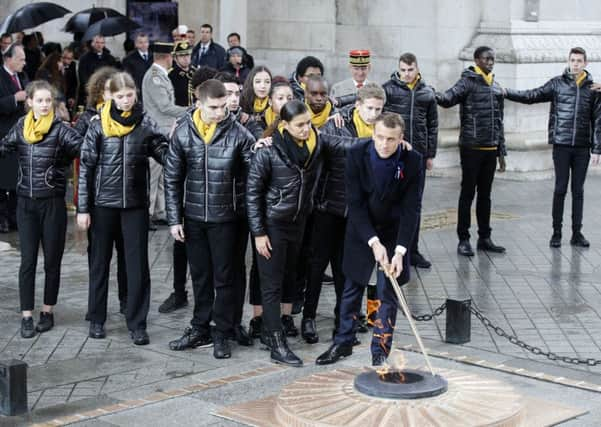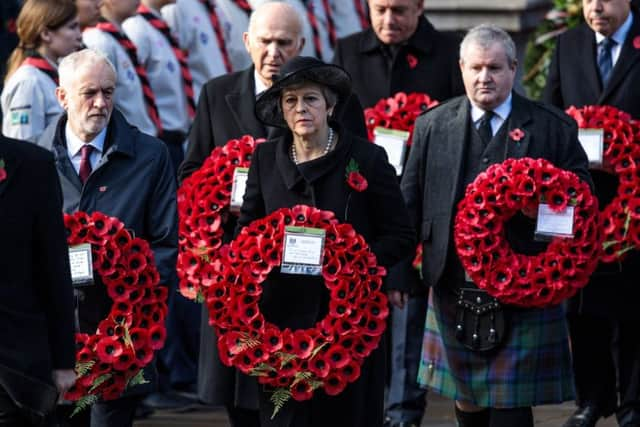More than 60 heads of state gather in Paris for Armistice commemorations


More than 60 heads of state and government gathered –silent, sombre and reflective – for a ceremony at the Tomb of the Unknown Soldier, the mute and powerful symbol of sacrifice to the millions who died from 1914-18.
They heard high-school students recalling the joy felt by soldiers and civilians alike when the fighting finally stopped at 11am on 11 November 1918.
Advertisement
Hide AdAdvertisement
Hide AdAnd they heard the commemoration’s host, French President Emmanuel Macron, warn about the fragility of peace and the dangers of nationalism: a theme that seemed directed, at least in part, at US President Donald Trump, who listened stony-faced.


“The traces of this war never went away,” Mr Macron said.
“The old demons are rising again,” he intoned. “We must reaffirm before our peoples our true and huge responsibility.”
The Paris weather – grey and damp – seemed aptly fitting when remembering a war fought in mud and relentless horror.
The commemorations started late, overshooting the centenary of the exact moment when, 100 years earlier at 11am, the silence of peace replaced the thunder of guns on the Western Front.
As bells marking the armistice hour started ringing out across Paris and in many nations hit by the four years of slaughter,
Mr Macron and other leaders were still on their way to commemorate the almost ten million soldiers who died at the centennial site at the Arc de Triomphe.
Under a sea of black umbrellas, a line of leaders led by Mr Macron and his wife, Brigitte, marched in respectful silence on the cobbles of the Champs-Elysees.
Mr Trump arrived separately, in a motorcade that drove past two topless protesters with anti-war slogans on their chests who somehow got through the rows of security and were quickly bundled away by police.
The Femen group claimed responsibility.
Advertisement
Hide AdAdvertisement
Hide AdLast to arrive was Russian President Vladimir Putin. German Chancellor Angela Merkel was positioned between Mr Trump and Mr Macron, standing together, shoulder to shoulder.
Overhead, fighter jets ripped through the sky, trailing red, white and blue smoke.
The geographical spread of the leaders in attendance showed how the “war to end all wars” left few corners of the earth untouched but which, little more than two decades later, was followed so quickly and catastrophically by the Second World War. On the other side of the globe, Australia and New Zealand held ceremonies to recall how the war killed and wounded soldiers and civilians in unprecedented numbers and in gruesome new, mechanised ways.
Those countries lost tens of thousands of soldiers far away in Europe and, most memorably in the brutal 1915 battle of Gallipoli, in Turkey.
In Paris, the jewel that Germany sought to capture in 1914 but which the Allies fought successfully to defend, the armistice commemorations were followed by the afternoon opening of a peace forum pushed by the host, Mr Macron.
Mr Trump was the most notable absentee at the forum, where Mr Macron’s defence of multi-lateralism took centre stage.
On Saturday, he was criticised for cancelling a visit to the Belleau Wood battleground north-east of Paris because of rain.